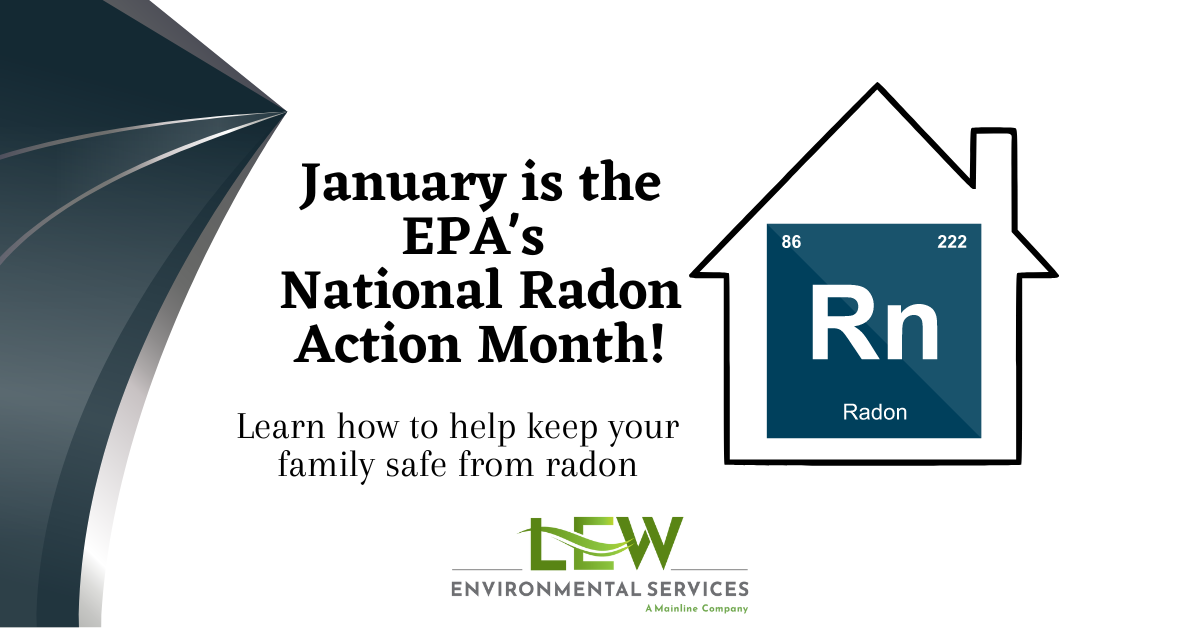January is National Radon Action Month!
 January 23, 2023 9:07 am
January 23, 2023 9:07 am
Did you know that radon is the leading cause of non-smoking related lung cancers in the United States? Radon is also the second leading cause of lung cancer worldwide, and is responsible for approximately 15% of all lung cancer deaths. These alarming statistics are part of the driving force beyond the EPA’s National Radon Action Month!
So what is radon? Radon is a colorless, odorless radioactive gas found throughout the world. It is produced naturally by the breakdown of uranium in soil, rock, and water. Radon is found in high levels throughout New Jersey due to its geology and uranium rich soil. Typically, radon gas disperses into the atmosphere and does not pose a threat to humans.
Radon becomes dangerous when it comes indoors and accumulates to high levels, particularly in poorly ventilated areas. It can seep into homes and businesses through cracks in the foundation or other openings. Radon can be inhaled into the lungs, exposing lung cells to radiation. This damages the DNA in the cells and increases the risk of lung cancer. Radon can also seep into well water used for drinking, showering, cooking, and laundry.
Your states’ climate and weather patterns can also affect radon levels inside of your home. Cold, dry weather can increase the concentration of radon in the air. Warm, humid weather can reduce it. Radon levels can vary vastly within a state and even dramatically vary within a single neighborhood.
Should I be concerned about radon in my home or work?
The Environmental Protection Agency (EPA) recommends homes be tested for radon at least once, and every two years thereafter. The EPA also recommends retesting sooner if:
- The home has not been tested for radon before
- The home has undergone significant renovations or other changes that could affect radon levels
- The home has a radon reduction system in place, to ensure that the system is functioning properly
The EPA estimates that in 2015, only about 30% of homes in New Jersey had been tested for radon. The U.S. Occupational Safety and Health Administration (OSHA) recommends that businesses consider testing for radon if employees are likely to be exposed to the gas for extended periods of time. This can include businesses that are located in buildings with basements or that have underground parking garages or tunnels.

How do I test for radon?
Testing for radon can be done by a professional or by purchasing an at-home testing kit. Professional radon testing includes devices like electret ion detectors, alpha track detectors, charcoal liquid scintillation devices, and continuous radon monitors to determine accurate levels of radon gas.
At-home test kits are generally less expensive than professional testing options. However there are some drawbacks with doing your own testing like:
- Accuracy: At-home radon test kits may not be as accurate as professional testing methods. Professional testing methods, such as those used by certified radon measurement professionals, are more likely to produce accurate results.
- Limited testing time: At-home test kits typically only test for radon over a short period of time, such as 48 hours. This may not be a representative sample of the average radon levels in your home over a longer period of time.
- Lack of oversight: At-home test kits do not provide the oversight and quality control that professional testing methods do. This can lead to errors or incorrect results.
- Inconclusive results: If the results of an at-home radon test are inconclusive, it can be difficult to know what to do next. Professional testing methods can provide more definitive results and guidance on how to proceed.
In New Jersey, nearly six million residents live or work in moderate- to high-risk areas for radon. If you’re concerned about radon exposure for you and your family, call the experts at LEW Environmental Services today!
Tags: radon